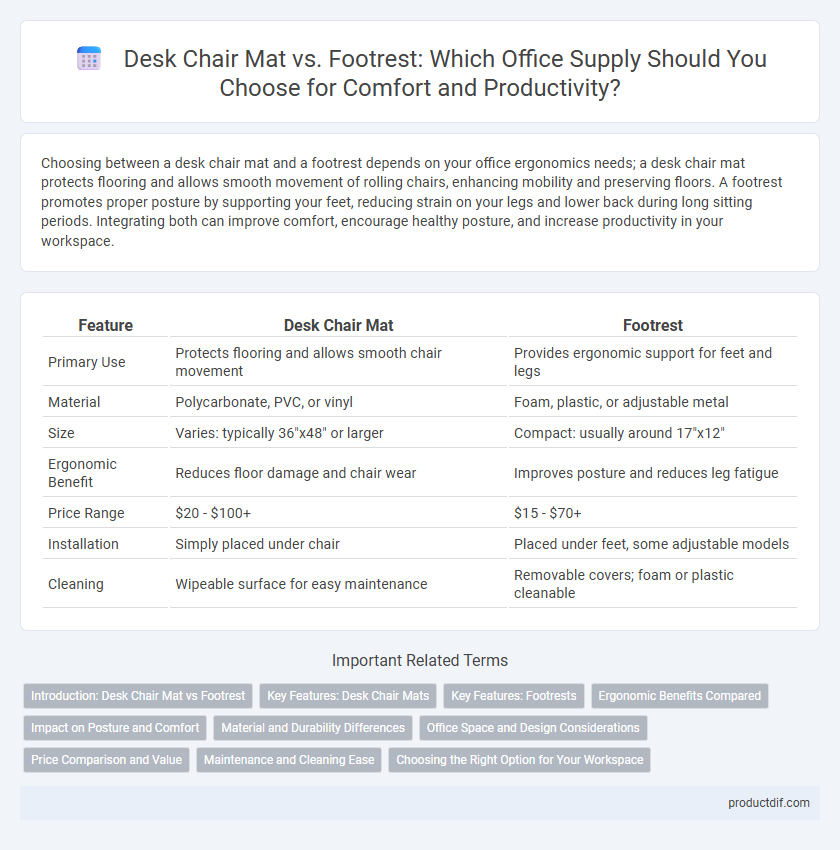Choosing between a desk chair mat and a footrest depends on your office ergonomics needs; a desk chair mat protects flooring and allows smooth movement of rolling chairs, enhancing mobility and preserving floors. A footrest promotes proper posture by supporting your feet, reducing strain on your legs and lower back during long sitting periods. Integrating both can improve comfort, encourage healthy posture, and increase productivity in your workspace.
Table of Comparison
| Feature | Desk Chair Mat | Footrest |
|---|---|---|
| Primary Use | Protects flooring and allows smooth chair movement | Provides ergonomic support for feet and legs |
| Material | Polycarbonate, PVC, or vinyl | Foam, plastic, or adjustable metal |
| Size | Varies: typically 36"x48" or larger | Compact: usually around 17"x12" |
| Ergonomic Benefit | Reduces floor damage and chair wear | Improves posture and reduces leg fatigue |
| Price Range | $20 - $100+ | $15 - $70+ |
| Installation | Simply placed under chair | Placed under feet, some adjustable models |
| Cleaning | Wipeable surface for easy maintenance | Removable covers; foam or plastic cleanable |
Introduction: Desk Chair Mat vs Footrest
Desk chair mats protect flooring from damage caused by rolling chairs and provide a smooth surface for mobility, enhancing ergonomic comfort in office spaces. Footrests promote healthier posture by encouraging proper leg positioning and reducing pressure on the lower back during prolonged sitting. Choosing between a desk chair mat and a footrest depends on the specific ergonomic needs and flooring conditions within the workspace.
Key Features: Desk Chair Mats
Desk chair mats protect flooring from damage caused by rolling office chairs, providing a smooth surface for easy movement and reducing wear on carpets and hardwood floors. They often feature non-slip backing to prevent sliding and come in various sizes and materials like polycarbonate or vinyl for durability and transparency. These mats enhance ergonomic comfort by supporting consistent chair mobility, minimizing strain on legs and back during extended desk work.
Key Features: Footrests
Footrests enhance ergonomic comfort by promoting proper posture and reducing pressure on the lower back and legs during extended sitting periods. They often feature adjustable height and angle settings to accommodate individual needs and improve circulation. Unlike desk chair mats, footrests specifically target leg support, making them essential for users seeking enhanced lower body comfort in office environments.
Ergonomic Benefits Compared
A desk chair mat provides ergonomic benefits by reducing strain on legs and feet through smooth chair movement and protecting floors from wear, promoting better posture. A footrest enhances ergonomic comfort by encouraging proper leg alignment and reducing pressure on the lower back and thighs, which helps improve circulation during long sitting periods. Both accessories contribute to a healthier workspace, but desk chair mats focus on floor protection and mobility, while footrests target posture improvement and pressure relief.
Impact on Posture and Comfort
Desk chair mats provide a smooth surface that allows easy movement, reducing strain from repetitive leg motions and promoting healthier posture by supporting natural sitting alignment. Footrests help alleviate pressure on the lower back and legs by encouraging proper hip and knee angles, enhancing overall comfort during prolonged sitting. Combining both can optimize ergonomic benefits, improving posture and reducing fatigue in office environments.
Material and Durability Differences
Desk chair mats are typically made from polycarbonate or vinyl, offering a hard, durable surface designed to protect flooring from chair casters and heavy foot traffic, with high resistance to scratches and wear. Footrests, by contrast, are often constructed from materials like memory foam, plastic, or wood, prioritizing ergonomic comfort and support, which affects their durability in terms of compression and surface wear rather than abrasion resistance. The material composition directly influences longevity: chair mats resist deformation and damage over extended use, while footrests may show signs of compression or material fatigue sooner due to constant pressure and body weight.
Office Space and Design Considerations
Choosing between a desk chair mat and a footrest hinges on optimizing office space and ergonomic design. Desk chair mats protect flooring and enable smooth chair mobility, ideal for larger office areas or hard floors, while footrests enhance posture and comfort without consuming much space. Integrating both can maximize functionality in compact office setups by balancing mobility, floor protection, and ergonomic support.
Price Comparison and Value
Desk chair mats typically range from $20 to $80, offering durable floor protection and easy chair movement, while footrests cost between $25 and $60, enhancing ergonomic comfort and reducing leg fatigue. Desk chair mats provide value through extending floor lifespan and improving mobility, whereas footrests deliver long-term health benefits by promoting better posture. Choosing between them depends on prioritizing either workspace protection or ergonomic support within a similar price bracket.
Maintenance and Cleaning Ease
Desk chair mats require regular cleaning to prevent dust and debris buildup, typically needing vacuuming or wiping with a damp cloth, while footrests generally demand less frequent maintenance, often just occasional surface cleaning. The smooth surface of desk chair mats allows for easy spot cleaning and quick removal of stains, whereas footrests may have textured or fabric surfaces that can trap dirt and require deeper cleaning methods. Choosing between the two depends on the available time for upkeep and the specific cleaning tools suitable for each item's material.
Choosing the Right Option for Your Workspace
Selecting the right desk chair mat or footrest depends on your workspace needs and ergonomic goals. Desk chair mats protect flooring and offer smooth mobility for rolling chairs, ideal for hard surfaces or carpets, while footrests promote better posture and reduce leg fatigue by elevating feet and encouraging circulation. Assess your workspace layout, flooring type, and comfort priorities to determine whether a chair mat, footrest, or a combination of both enhances productivity and well-being.
Desk Chair Mat vs Footrest Infographic

 productdif.com
productdif.com